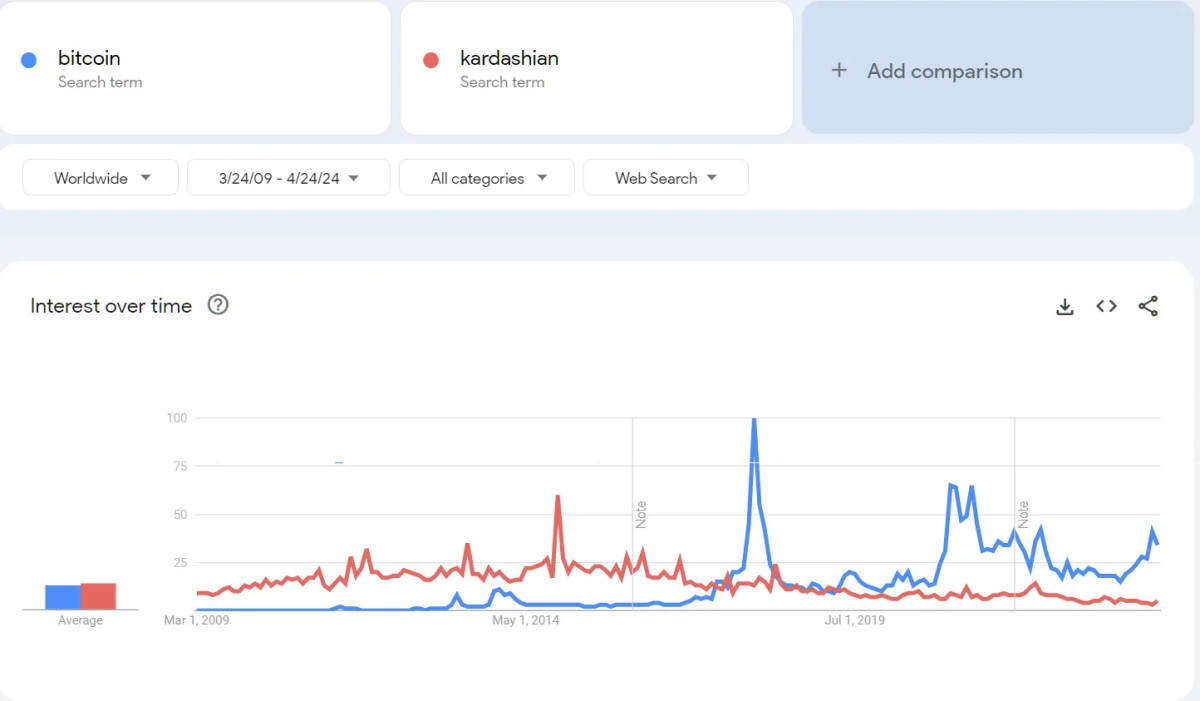Orange peeling stopped working.

Originally published on Medium.
In the context of Bitcoin, “normie” means something like “I don’t know, I don’t care.” And “normie” comes from “normal.” In other words, the average person is not interested in Bitcoin, at least not enough to use it.
Underexposure is not a problem. Bitcoin now regularly appears in mainstream media headlines, including USAToday, Fox, Forbes, The Economist, and Le Monde. Terms Bitcoin It generates more search traffic than any other term most of us are tired of hearing. kardashian.

But while virtually every human and most seagulls have heard of Bitcoin, fewer than half a million people use it every day.
And this is not for lack of effort from the Bitcoin community. We have written books, blogs (lots and lots of blogs!), recorded videos, organized conferences and meetups, and hosted podcasts (lots and lots of podcasts!) preaching the value of Bitcoin. We are doing more to convert the Coin Pagans than most religions, yet our beautiful temples sadly remain empty.
Educating the world about Bitcoin has been successful in building a community of knowledgeable, dedicated and passionate people in technology, economics, politics and finance, but orange peeling has taken us as far as we can go. As with many strategies, the marginal benefits of educating the world were significant in the early stages but then diminished.
Orange peeling stopped working.
Show me, don’t tell me
I know how controversial this claim is because orange peeling is very popular. This is a strategy that has served us well over the past 15 years. And most Bitcoin users like education. We tend to be critical thinkers who devour blogs, books, and podcasts to learn more about our passions and keep our minds sharp.
But we don’t study all topics, there is no need for that. I have little idea what good exercise and healthy eating do to my body at a cellular level, but I feel the benefits of both. In fact, our world is so complex that no one can really understand every important aspect. How many welders and virologists, aeronautical engineers and app developers actually understand each other’s fields? Most people are ignorant of the most useful topics, even in a very complex world.
But expertise is not a prerequisite for enjoyment. I use all kinds of products and technologies: TikTok, AI assistants, and even water treatment plants. Just because it makes my life better. That’s all I really need to know. No technical understanding required.
All you need to benefit from the technology is a utility. It has to somehow improve people’s lives, whether they understand it at a granular level or not. We can tell people about the benefits of Bitcoin until we’re exhausted and people get annoyed. What matters is how you actually experience it. We need to stop telling them and start showing them how great the Bitcoin economy will be. Less theory and more practice.
Consider remote work. In the 1970s, large companies like IBM were simply taking ideas and experimenting with them on a few employees at a time. Then came technologies like broadband and Wi-Fi, corporate VPNs, cloud storage, and cheap, powerful computers that fit into our pockets and desks. Don’t forget all your software: Zoom, Teams, Slack, Meet, SharePoint, etc.
But just 10 years ago, remote work was something many people had heard of but few had tried. It was growing by a few percent every year. Enter COVID-19. The rates doubled, then tripled. Currently, 67% of our tech workers work mostly or entirely from home.
Yes, Corona was a shock, but pandemics are not new. The last is that technology has revolutionized the work landscape. Technology has become truly useful, and the pandemic has given us an opportunity to realize that. Would the remote work revolution have ultimately occurred without the pandemic? Almost certainly, if not sooner. Would this have happened without technology? The question is meaningless because technology defines how we think about “remote work.”
Useful technologies change behavior, habits, and society. Sometimes radically.
We Bitcoin users need to learn, internalize, and remember this lesson. The orange pill has stopped working, at least at this scale. Experience is what changes people’s minds. We build that experience through technology, not conferences. As soon as it starts providing experiences that surpass anything fiat can do, people will automatically adopt Bitcoin. No book or blog will change their minds or habits until we provide that service.

Where do I start?
So if the point is to improve people’s lives, whose lives are we talking about? There is a big difference between the corner shops of Hyderabad and the outdoorsy Canadians. Different interests, different needs.
Television, PC, Internet, smartphone, Facebook, AI. They are all rooted in the same demographic: people with disposable income in developed countries. Facebook took this approach to the extreme, initially opening it only to students attending elite Western universities. And now it has become my aunt’s favorite technique. Another lesson.
So the way forward is to leverage the borderless, open, censorship-resistant advantages of Bitcoin and, most importantly, improve the lives of wealthy people who can spend their money as a peer-to-peer currency. Give us a better way to transact directly with each other.
In practice, this often means adding Bitcoin to the apps they use. It may also mean disintermediating services you already use. It’s like Uber connecting gig drivers directly to passengers without cutting costs. It’s like connecting artists directly with their fans without Spotify or the record label covering the cost. It’s like DoorDash pays Dashers directly without taking a cut.
The winning formula is to embed our technology into existing, suboptimal user experiences, like the iPhone did with digital cameras. Utility improves UX, and UX drives adoption. The margins of existing companies are our opportunity. This is the essence of destruction.
I also want to make it clear that better arrangements for wealthy Westerners are no more important than giving people in developing countries access to modern financial services and a haven from government corruption. That’s very important too. It’s just a more effective way for wealthy Westerners to move markets and spread technology. They are the gateway drug and beachhead for mainstream adoption. But yes. Transforming the world through Bitcoin and improving the lives of everyone in it remains the ultimate goal.
Utilities > Education
Education is important for entrepreneurs, engineers, investors, and others who need information on an inside-baseball level. It’s usually easier to improve something once you understand how it works than through random trial and error.
But if you want to use something, you only need to know how, not why. Dozens of animal species use tools to improve their lives. Some of them may have a vague idea of how the tool works. In other words, thicker rod = stronger and harder. Thin stick = light and flexible, that’s enough. We all already use countless technologies without understanding them simply because we like the experience.
You don’t really need to do a lot of research on how to improve people’s experience with Bitcoin. It’s easy to find which apps are most popular. Many, if not all, aspects can be improved with borderless peer-to-peer payments. Yes? That’s the whole idea, right? Now let’s add borderless peer-to-peer payments or rebuild them with our technology. If we do it right and Bitcoin is really better (of course it is), we won’t need to convince people anymore. They will adopt it and convince each other.



